Former Kelme director Vicente Belda and his son caught up in Operacion Ilex doping investigation
Miguel Angel Lopez denies any involvement in Spanish doping investigation

Former Kelme directeur sportif Vicente Belda and his son Vicente, who works for the
Astana Qazaqstan team, are reportedly under investigation after Spain’s Guardia Civil police force dismantled a drug trafficking ring that supplied drugs to athletes and offered other sporting services including university-run stress tests and medical analysis.
Codenamed Operacion Ilex, the police investigation began in January 2021 when the Guardia Civil started to look into a suspected ring based in Caceres in western Spain. So far, two people have been arrested and a further six are under investigation.
Vicente Belda senior was a reputed former professional racer and a former sports director at the Spanish Kelme squad. His management career ended after he was linked to Spain’s most notorious anti-doping sting, Operación Puerto back in 2006. He was cleared of any charges eight years later. His son, also called Vicente, currently works as a soigneur for the Astana Qazaqstan team. There is no evidence or indication the team is involved.
Earlier this year, Colombia's Miguel Angel López was briefly suspended by his Astana Qazaqstan team after reports in Spain suggested he was under investigation for links to Marcos Maynar, who is at the centre of Operacion Ilex.
Speaking to the Spanish news agency Efe via his lawyers, López denied any wrongdoing and he was subsequently reinstated by Astana. On Thursday he quickly posted a message on social media.
"News has been published in different media where it is stated that I am being investigated in a supposed doping network," Lopez wrote.
"I currently don't have any active investigation or trials underway. My lawyers are ready to initiate any necessary legal action."
The latest race content, interviews, features, reviews and expert buying guides, direct to your inbox!
In a statement released on Thursday, which outlines the operation without naming any of those under investigation, the Guardia Civil said that the ring captured ‘clients’, one of whom is underage, through “various people closely connected to the world of professional sport, offering them the services of a well-known sports doctor.”
The Guardia Civil statement then describes how “These services included the preparation of training plans and nutrition programs as well as the consumption of medication and banned substances in sport.”
“During the investigation, it has been corroborated how these sportspeople, once they had been in contact with the doctor and his assistant, a Doctor of Physiology, were profiled medically through stress tests and other types of analysis."
"These tests were carried out in the Faculty of Sports Science in [the University of] Extremadura, where one of the key names under investigation was teaching, along with the fabrication, reception and storing of certain medicaments.”
The sportspeople were then given a specifically designed training plan, the Guardia Civil said, in which the consumption of substances banned both in Spain and by WADA were included. The annual price charged, depending on the athlete’s level and their likelihood of winning prize money, was up to 3,000 euros per season.
After a year’s investigation, three individuals who acted as distributors of the substances supplied by the ring and the final consumers were identified as operating in Portugal, Guipuzcoa in the Basque Country and Castellon in eastern Valencia, the police statement said. Coded message applications were used in some cases to increase the security of the ring's illegal operation.
Amongst the banned and/or unauthorized substances seized, the Guardia Civil said, were Actovegin - a form of concentrated calves’ blood used back in the day by Lance Armstrong and the US Postal team, Theophyline - a bronchodilator, and Menotropin.
As the investigation continues, two people have already been arrested on charges of trafficking substances and doping in sport, as well as belonging to a criminal organisation and money laundering, with a further six under investigation. Clients involved include cyclists, a trainer of a swimming club in Castellon and footballers from a team in Extremadura in the regional league.
The investigation is widely believed to be linked to the Guardia Civil’s lengthy enquiries into Doctor Marcos Maynar, described by El País newspaper on Thursday as “a sports doctor who is an old acquaintance of the anti-doping authorities.”
In 2009, Maynar was suspended from professional activities for ten years by the Portuguese cycling federation authorities on a number of charges, mostly relating with supplying banned substances when he was a team doctor at the Portuguese squad LA-MSS.
Another of the eight under investigation is the former cyclist Angel Vázquez Iglesias, banned for doping for four years from 2007 and 2010. Iglesias raced for the final year of his career at LA-MSS.
Cyclingnews is the world's leader in English-language coverage of professional cycling. Started in 1995 by University of Newcastle professor Bill Mitchell, the site was one of the first to provide breaking news and results over the internet in English. The site was purchased by Knapp Communications in 1999, and owner Gerard Knapp built it into the definitive voice of pro cycling. Since then, major publishing house Future PLC has owned the site and expanded it to include top features, news, results, photos and tech reporting. The site continues to be the most comprehensive and authoritative English voice in professional cycling.